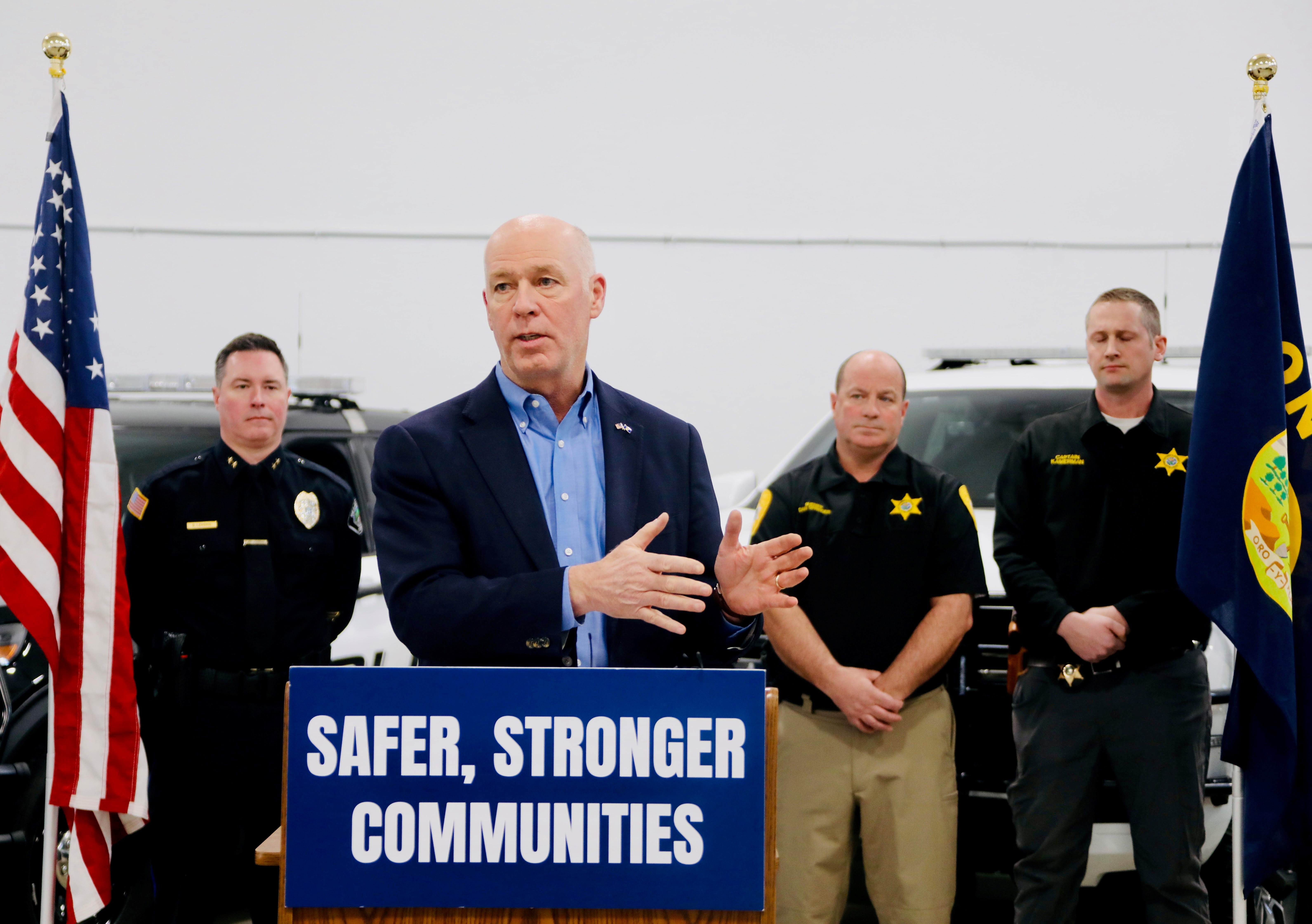Governor Gianforte, Attorney General Knudsen Highlight New Law to Bring Human Traffickers to Justice
Governor proclaims January Human Trafficking Awareness Month
Governor’s Office, January 04 2024
BELGRADE, Mont. – Joined by Attorney General Austin Knudsen, law enforcement officers, and nonprofit leaders, Governor Greg Gianforte today held a press conference to mark Human Trafficking Awareness Month.
“Human traffickers are despicable, ruthlessly preying on people and committing heartbreaking crime. We won’t tolerate these heinous crimes in Montana, and will hold traffickers accountable to the fullest extent of the law,” Gov. Gianforte said. “As we do, I encourage Montanans to be a part of the solution. Educate yourselves on the signs of human trafficking, and if you suspect something, say something.”
Attorney General Knudsen added, “I am committed to doing everything I can as attorney general to end human trafficking in Montana. At the Department of Justice, we have strengthened the law and dedicated more resources to finding and holding traffickers and patrons accountable. Law enforcement can’t be everywhere. I encourage every Montanan to learn the signs of human trafficking and if you see something, say something. Together, we will continue to send the message to criminals that Montana is a bad place to do business.”

Gov. Gianforte speaking at a press conference in Belgrade
Last spring, the governor signed into law House Bill 112, sponsored by Rep. Jodee Etchart, R-Billings, to strengthen Montana’s human trafficking laws and hold human traffickers accountable. Introduced at the request of the attorney general, the new law increases penalties for sex traffickers, provides prosecutors with more tools to prosecute sex traffickers, and expands the definition of human trafficking.
Speaking to the impact of the law at the press conference today, Bozeman Police Chief Jim Veltkamp shared, “This law allowed us another tool in the toolbox. We were able to expand the investigations and move forward with prosecutions.”
Lowell Hochhalter, who leads the anti-human trafficking nonprofit The LifeGuard Group, also spoke to the importance of the new law.
“What you really did with this bill, Governor, Attorney General, and the legislature, is you communicated to victims and survivors in this state that they matter. That their lives matter,” Hochhalter said. “When it comes down to human trafficking, please don’t leave that term without recognizing that ‘human’ is the key element. We are talking about daughters, aunts, sons, cousins, nieces, and nephews who are being trafficked.”
According to the Montana Department of Justice (DOJ), human trafficking cases have more than doubled in Montana since 2021. Seven human trafficking cases were tracked in 2015, compared to 68 cases in 2021, 106 cases in 2022, and 143 in 2023.
“When we think of human trafficking, we think of places away from Montana. We think of our issues at the southern border. We think of other states, large metropolitan areas,” said Belgrade Police Chief Dustin Lensing. “It’s become apparent that it’s very much a problem here in Montana.”
Law enforcement leaders joined the governor and attorney general in calling for Montanans to be a part of the solution to end human trafficking.
“One thing that we have an advantage on here in Montana is our network between the state and local partners. It’s unlike any other state. But, when it comes to human trafficking, it really starts at the local level with citizens recognizing what is or isn’t normal,” Gallatin County Sheriff Dan Springer said.
DOJ provides the following potential indicators of human trafficking:
- Young person who is very hesitant to engage in conversation. Eyes are always downcast, avoiding eye contact, especially with men. Poor physical state…tired, malnourished, or shows signs of physical abuse or torture.
- Seems to have trouble responding to what their name is or what location (city or even state) they are in. (Victims’ names are often changed, as are their whereabouts. They typically do not stay in one location for long – at times for 24 hours or less).
- Wearing clothes that do not fit the climate or the situation such as short shorts or skirts, tank tops, and no jacket in the middle of winter.
- Lack of control over money, personal possessions like bags, IDs, or documents. May also be carrying very few possessions in a plastic bag.
- May be accompanied by a dominating person, or someone they seem fearful of. That controlling person may also be someone who does not seem to “fit,” such as a much older individual, an individual of a different race, or with behavior seemingly inappropriate with the suspected victim.
- Young girl or boy hanging around outside a convenience store, truck stop, casino, or other location. May be approaching different vehicles or men they do not seem to know.
If you believe you witness human trafficking, DOJ provides the following guidance:
- If the situation is an emergency, call 911.
- Do not intervene if you see suspected trafficker(s). Remain at a safe distance or in your vehicle.
- In non-emergency situations, call or text 1-833-406-STOP (1-833-406-7867) OR reach and advocate via live chat at 406stop.com.
- When possible, take images with your cellular device of the suspected trafficker(s), victim(s), and vehicle license plate(s).
“With more Montanans aware and engaged, we can get victims the help they need to recover and rebuild,” Gov. Gianforte said.
The governor proclaimed January as Human Trafficking Awareness Month, and Thursday, January 11, 2024, as Human Trafficking Awareness Day. The governor’s proclamation may be viewed here.
This article was originally published on the Montana Government Official State Website.